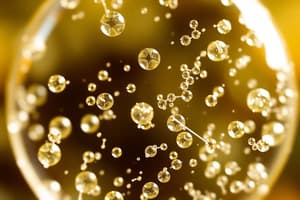Podcast
Questions and Answers
What primarily determines a drug's physicochemical properties?
What primarily determines a drug's physicochemical properties?
- The drug's administration route
- The drug's molecular structure (correct)
- The drug's distribution in the body
- The drug's dosage form
Why is the ionization of a drug significant?
Why is the ionization of a drug significant?
- It influences the drug's color
- It impacts the drug's physical, chemical, and biological performance (correct)
- It determines the drug's shelf life
- It affects the drug's taste
What process describes a compound dissociating into ions in an aqueous solution?
What process describes a compound dissociating into ions in an aqueous solution?
- Ionization (correct)
- Evaporation
- Saturation
- Precipitation
What does the acronym ADME represent in pharmacology?
What does the acronym ADME represent in pharmacology?
What is a defining characteristic of weak electrolytes?
What is a defining characteristic of weak electrolytes?
What distinguishes strong electrolytes from weak electrolytes?
What distinguishes strong electrolytes from weak electrolytes?
Which statement accurately describes amphiprotic solvents?
Which statement accurately describes amphiprotic solvents?
According to Arrhenius's definitions, what do acids yield in water?
According to Arrhenius's definitions, what do acids yield in water?
What is a conjugate base?
What is a conjugate base?
What does the ionization constant (Ka) indicate about a weak acid?
What does the ionization constant (Ka) indicate about a weak acid?
What does a higher Ka value indicate about an acid?
What does a higher Ka value indicate about an acid?
At what pH is a solution considered neutral?
At what pH is a solution considered neutral?
What is the Henderson-Hasselbalch equation for weak acids?
What is the Henderson-Hasselbalch equation for weak acids?
What is the effect of lower pH on the solubility of weak bases?
What is the effect of lower pH on the solubility of weak bases?
What type of pH results from a salt formed from a weak acid and a strong base?
What type of pH results from a salt formed from a weak acid and a strong base?
How does increasing urinary pH affect the excretion of weak acids?
How does increasing urinary pH affect the excretion of weak acids?
What does pH + pOH equal?
What does pH + pOH equal?
What is the significance of ionization regarding drug absorption?
What is the significance of ionization regarding drug absorption?
What is hydrolysis in relation to salts?
What is hydrolysis in relation to salts?
Which aspect does the pH partition hypothesis emphasize regarding drug absorption?
Which aspect does the pH partition hypothesis emphasize regarding drug absorption?
Flashcards are hidden until you start studying
Study Notes
Ionization and Drug Properties
- Drug ionization influences absorption, distribution, metabolism, and excretion (ADME).
- Most drugs are weak electrolytes, meaning their ionization depends on the environment's pH.
- Strong electrolytes completely ionize in solution (NaCl, HCl, NaOH).
- Weak electrolytes partially ionize in solution (aspirin, phenobarbital, sulfadiazine).
- The Henderson-Hasselbalch equation predicts the ionization state of weak acids and bases based on pKa and pH.
pH and Ionization
- pH affects drug ionization and solubility.
- Ionized drugs are more soluble in aqueous solutions.
- Unionized drugs are more lipid-soluble, favoring absorption through cell membranes.
- Weak acids ionize more at higher pH (above their pKa).
- Weak bases ionize more at lower pH.
Salts and pH
- Salts formed from strong acids and weak bases create acidic solutions (e.g., ephedrine HCl).
- Salts formed from weak acids and strong bases create alkaline solutions.
- The hydrolysis of salt ions in water can influence the solution's pH.
Ionization and Drug Absorption
- The pH partition hypothesis explains that drug absorption depends on ionization and pH gradients in different body compartments.
- Ionized drugs are poorly absorbed because they are less lipid-soluble.
- Unionized drugs are more readily absorbed due to their higher lipid solubility.
Examples
- Sulfisoxazole is more effective than sulfadiazine for urinary tract infections (UTIs) due to its lower pKa, resulting in more ionization in urine and enhanced excretion.
Key Concepts
- Understanding drug ionization and its dependence on pH is crucial for predicting drug behavior in the body.
- pKa and pH are critical factors influencing drug absorption, distribution, and elimination.
- The Henderson-Hasselbalch equation is a valuable tool for predicting drug ionization.
- Adjusting urinary pH can impact drug excretion by influencing ionization.
Studying That Suits You
Use AI to generate personalized quizzes and flashcards to suit your learning preferences.





